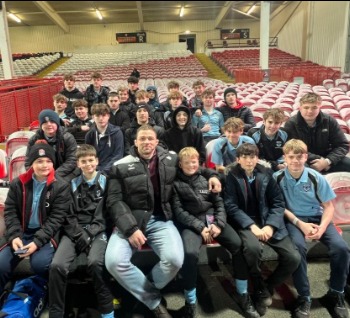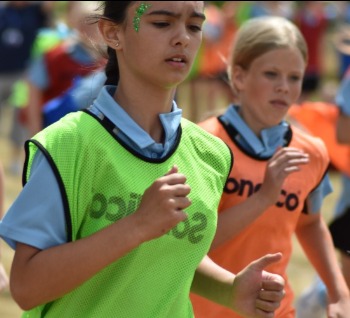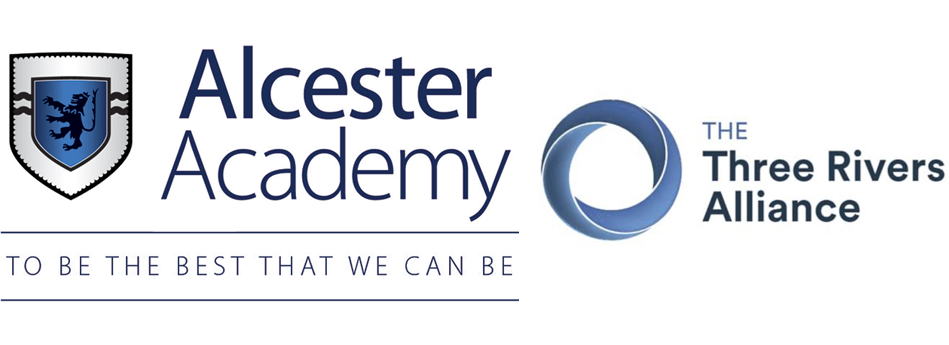Physical Education

Mr M Tuckey: Teacher of PE
marktuckey@alcesteracademy.org.uk

Key Stage 3 PE Curriculum Overview
Throughout KS3 students will build on and embed the physical development and skills learned in Key Stages 1 and 2. Students will begin to develop an understanding of what makes a performance effective and how to apply these principles to their own and others work:
- PE is studied in 6 blocks throughout the academic year, with each scheme of learning lasting a half-term
- Students will undertake a practical progress check of performance at the end of each scheme, with data recorded by class teacher for monitoring and intervention
- Within lessons, students will also develop both Officiating and Leadership skills, with progress within these areas being monitored by CORE TASK assessments in different sporting environments
- Students in Year 7 will complete a ‘Baseline Assessment’ to identify a suitable KS3 PE target and set ability group for future study within KS3 Physical Education
- PE is taught in mixed gender groups set by ability, allowing all students to access the same learning experience in a wide range of curriculum activities
Intent
The KS3 curriculum aims to offer students a broad range of experiences in both individual and team sports. Students will build on and embed the physical development and skills learnt in Key Stages 1 and 2. Assessments will take place in 3 key areas of Performance, Officiating and Leadership in KS3, which all are able to access regardless of ability. Assessments for Officiating and Leadership will take place within Year 8 curriculum.
In KS3 students will also begin to develop an understanding of what makes a performance effective and how to apply these principles to their own and others work
The KS4 qualification course offers students the chance to start a journey into sport. The qualification prepares them for future pathways into sport and progression to further study beyond Level 2/GCSE.
The KS4 core curriculum provides students with an insight into lifelong participation, as well as highlighting the importance of healthy lifestyles. It also provides an opportunity for students to practise and gain more independence on the skills learnt within KS3 – Perform, Officiate and Lead.
Curriculum activities within PE are based on staff expertise, sports students are required to be successful in examination PE and sports that we know students enjoy through our extra-curricular programme.
Learning and Teaching is a key component of PE lessons at Alcester Academy with Modelling, Questioning, Practise and Challenge all being embedded. Students are baselined in Year 7, with learning then being differentiated to student targets of performance throughout the remainder of KS3. Students will then revert to whole school targets for examination study within sport beginning in KS4.
Through maximising student participation in a broad and diverse curriculum and support for students within lessons, all students can access all areas of the PE curriculum.
Implementation
Sports studied within the curriculum are split into ‘Winter’ and ‘Summer’ activities. Students study PE in 6 blocks throughout the academic year, with each scheme of learning lasting a half-term.
Students in Year 7-10 will have 2 hours of PE per week, with students in Year 11 studying 1 hour per week. These include individual and team sports which cover invasion games, racket sports, striking and fielding games, net /wall games and athletics.
Student performance is assessed across several key processes within KS3 as outlined in curriculum overview document. Students are also assessed in their role as an official and leader through the completion of practically assessed core tasks. Each year the content is more challenging and requires application of advanced skills towards the end of the key stage. These assessments build each year as students begin to adapt and refine their skills across a wide range of curriculum areas.
To achieve an accurate assessment of individual pupils we formatively assess at the end of each completed scheme of learning to ensure that whole school data and assessment has the holistic progress of our pupils at its heart across the whole curriculum. We assess throughout the scheme to monitor student progress in addition to a final assessment. Data is used to identify and document below and above par performance for pupil and teacher which, in turn, triggers a series of interventions.
The leadership and officiating skills students develop fully prepare them for their pathway into KS4 CORE as well as examination PE/Sport and their own involvement in sport beyond school. It helps students develop self-confidence, communication and independence in Sport whilst supporting student challenge and engagement within the subject beyond solely performance.
To assist in the creation of an enriching Physical Education programme, long term plans have been developed with the intention of giving the students experience of a number of different sports that cover the full range of National Curriculum requirements.
In lessons we aim to develop a wide range of skills and the ability to use tactics, strategies, and compositional ideas to perform successfully. When they are performing, they think about what they are doing, analyse the situation and make decisions. They also reflect on their own and others’ performances and find ways to improve them.
As a department we work hard to ensure each student has exposure to sport subject specific terminology and key terms. These are used not only to improve performance and understanding of skills and techniques but to allow students to perform effectively in the roles of both an official and a coach. Students are encouraged to use such terminology in the right context wherever possible.
Impact
Students make significant progress in building upon skills learned within Key Stage 1 and Key Stage 2. Students can perform a variety of roles within sport including Performer, Coach and Official and develop the confidence and ability to do so effectively.
The Examination courses offered helps students to progress their knowledge of PE and Sport and prepare them for further study within the subject area. Our current CAMNAT Sports Studies qualification allows students to continue onto Level 3 BTEC or A-Level PE courses and eventually specific degree qualifications for students wishing to pursue further study within Sport. Students may go onto university to study Sport Science, Sports Coaching, PE teaching or other Sport related courses.
Other students may go on to enjoy and participate in sport in their leisure time which could include them becoming officials and coaches as well as performers.
Year 7 Range & Content
Within the Year 7 curriculum students will follow a programme of study in which they will be taught a wide range of sports and activities covering:
- Invasion Games
- Net and wall
- Striking and Fielding
- Health and Fitness
- Other individual
- The main focus for the Year 7 curriculum is on students developing the skills and Physical and mental capacity which they have learned in Key stages 1 and 2.
- Students will also begin to learn the importance of developing skills associated with the roles of officiating and leadership in sport, which are crucial within PE as well as everyday life.
- Students will be assessed Practically, as well as on their ability to Officiate and Lead within Sport.
- Students in Year 7 complete home learning as per Alcester Academy rota policy.
| Year 7 Learning Activities (Half-termly rotation) | |
| Autumn & Spring: Half-term 1 Baseline Assessment: Football/Bench-ball/ Badminton/Health and Fitness/Rounders/Athletics Invasion: Handball/Basketball/Football/Tag-Rugby/Netball Net and Wall: Badminton/Table-Tennis Other*: Gymnastics/Dance/Health and Fitness
| Summer: Net and Wall: Tennis Striking and Fielding: Rounders/Softball/Cricket Other: Athletics OAA |
Year 8 Range & Content
Students in Year 8 are taught the same curriculum areas in Year 7, but with a particular focus on Developing the skills they have learned in a variety of activities under competitive pressure.
Students will be assessed on their ability to select and combine skills accurately in performance and to demonstrate leadership and officiating skills within larger groups of students.
Within Year 8 students will be assessed on Year 7 processes as well as their ability to make and apply decisions within performance. Students will be assessed Practically, as well as on their ability to Officiate and Lead within Sport.
Students in Year 8 complete home learning as per Alcester Academy rota policy.
| Year 8 Learning Activities (Half-termly rotation) | |
| Autumn & Spring: Invasion: Handball/Basketball/Football/Tag-Rugby/Netball Net and Wall: Badminton/Table-Tennis Other*: Gymnastics/Dance/Health and Fitness/OAA
| Summer: Net and Wall: Tennis Striking and Fielding: Rounders/Softball/Cricket Other: Athletics OAA |
Year 9 Range & Content
In Year 9 students follow a programme of study which allows them to begin to select and combine the skills they have learned in lower KS3 with a focus on learning advanced skills within sport.
A key process of the Year 9 curriculum is the students evaluating and improving not only their own performance, but the performance of their peers. Students also develop their independence in through performance, Officiating and Leadership.
In a range of sports and activities students will begin to develop confidence in leading warm-ups and skill-based sessions for larger groups of students.
Students in Year 9 complete home learning as per Alcester Academy rota policy.
| Year 9 Learning Activities (Half-termly rotation) | |
| Autumn & Spring: Invasion: Handball/Basketball/Football/Tag-Rugby/Netball/Volleyball Net and Wall: Badminton/Table-Tennis Other*: Gymnastics/Dance/Health and Fitness/OAA
| Summer: Net and Wall: Tennis Striking and Fielding: Rounders/Softball/Cricket Other: Athletics OAA |
KEY PROCESSES
We aim to ensure that all pupils:
- Develop competence to excel in a broad range of physical activities.
- Are physically active for sustained periods of time.
- Engage in competitive sports and activities.
- Lead healthy, active lives.
To achieve these aims we focus on the following essential skills and processes in P.E. that pupils need to learn to make progress.
Accurate replication
Students should be able to:
- Accurately replicate basic skills.
- Develop their ability to fine tune these skills to suit the environment in which they are engaged.
- Understand that different sports demand different skill types.
- Adapt their skills to the needs of the activity.
Developing physical and mental capacity
Students should be able to:
- Develop their physical strength, stamina, speed and flexibility to cope with the demands of different activities.
- Develop their mental determination and resilience to succeed.
Developing skills/performances in Physical activity
Students should be able to:
- Refine and adapt skills and techniques.
- Develop the range of skills they use to improve the precision, control, and fluency of their techniques.
Making and applying decisions
Students should be able to:
- Select and use tactics, strategies and compositional ideas effectively in different creative, competitive and challenge-type contexts.
- Refine and adapt ideas and plans in response to changing circumstances.
- Plan and implement what needs practicing to be more effective in performance.
- Recognize hazards and make decisions about how to control any risks to themselves and others.
Making informed choices about healthy, active lifestyles
Students should be able to:
- Identify the types of activity they are suited to.
- Identify the types of role they would like to take on.
- Make choices about their involvement in healthy physical activity.
Evaluating and improving
Students should be able to:
- Reflect and analyse performances, identifying strengths and weaknesses.
- Make decisions about what to do to improve their performance and the Performance of others and act on these decisions in future performances.
- Be clear about what they want to achieve in their own work and what they have actually achieved.
Each of the above elements is weaved into an extensive Key Stage 3 curriculum. Throughout the Key Stage, students will be given the opportunity to experience a breadth of sports including Rugby, Football, Netball, Hockey, Badminton, Basketball, Dance, Gymnastics, Fitness, Table Tennis, Cricket, Rounders, OAA activities, Volleyball, Tennis and Athletics.
The range, breath of our curriculum is designed to ensure that we immerse students into a comprehensive diet of physical activities and sport, in the hope that we engage, excite and excel our students within the subject.
As a result, many of our Key Stage 3 students continue their studies into Key Stage 4 as part of the CAMNAT Sport Studies course.
Key Stage 4 CORE PE
The KS4 Core PE curriculum serves to reinforce the benefits of physical activity and school sport in the view to build on the knowledge, understanding and skills that are established in KS3 PE programme. We strive to empower students to develop a desire to lead an informed, active and healthy lifestyle not only at their time during school but for the years after they leave Alcester Academy. The department strives to cater for all students, providing a wide range of opportunities.
Key Stage 4 PE Range and Content
Within KS4 CORE PE students will have two lessons per week in year 10 and one lesson per week in Year 11.
During their hour PE lesson students are able to select an activity option which they have an interest in for a period of 1 half-term. Each half-term students will be presented with differing activities covering a range of Invasion, Net and Wall, Striking and Fielding, and individual sports throughout the Autumn, Spring and Summer terms.
KS4 CORE PE lessons present students with the opportunity to tackle complex and demanding physical activities, whilst developing their fitness and developing an active, healthy lifestyle. Throughout the activities students will:
- Develop a range of tactics and strategies
- Develop the techniques of skills learned in KS3
- Evaluate performance
- Continue to take part in regular competitive sport outside of school
Students assessed on their Attitude to Learning within KS4 CORE PE.
| KS4 CORE PE Learning Activities (Half-termly rotation) | |
| Autumn & Spring: Invasion: Handball/Basketball/Football/Tag-Rugby/Rugby/Netball Net and Wall: Badminton/Table-tennis/Volleyball Other: Health and Fitness/Bench-ball/Gym/Dance | Summer: Net and Wall: Tennis Striking and Fielding: Rounders/Softball/Cricket Other: Athletics OAA |
KS4 Examination PE - CAMNAT Sport Studies (Level 1 / 2)
The OCR Cambridge National in Sport Studies qualification encourages students to think for themselves about the study of sport and the application to real life practical sport, leadership and the evaluation of skills. The course allows them the opportunity to study engaging topics affecting sport which are of current relevance through the contemporary issues unit, both play and lead sporting activities, as well as have the chance to explore the world of sport and the media in an externally assessed unit of coursework.
By providing this course students are offered an opportunity to study towards an engaging qualification where learning will be used in practical, real-life situations, such as:
- Understanding contemporary issues in sport and how they impact on different sporting activities
- Applying your skills as both a performer in two different sporting activities and as a leader in one sporting activity
- How to be a sports leader, through using your initiative to solve problems and making decisions when dealing with rapidly changing conditions and situations
- Understanding the relationship between sport and the media and applying this to real life examples
- How to evaluate and interpret the different ways in which sport is represented by the media
- Applying your skills to participate in an outdoor and adventurous activity in a natural setting and environment. This will help you to develop independence and confidence in using skills that would be relevant to the Exercise, Physical Activity, Sport and Health sector.
The qualification also helps our students to develop learning and skills that can be used in other life and work situations, such as:
- Completing research
- Working with others
- Planning training programmes
- Evaluating and making recommendations to help improve performance
- Creating and delivering presentations
- Writing reports
- Leadership skills
- Healthy living and lifestyle skills
The qualification equips learners with sound specialist knowledge through practical application. Two mandatory units and one optional unit from a choice of two are completed over the 3 years of KS4 study.
The two mandatory units are:
R184: Contemporary issues in sport
This is assessed by an exam. By completing this unit learners are able to understand a range of topical and contemporary issues in sport, including learning about participation levels and barriers to completing sporting activities.
Learners will also learn how participation is impacted by the promotion of values and ethical behaviour, about the role of high-profile sporting events, the role of national governing bodies and how technology is used in within sport.
Topics include:
- Issues which affect participation in sport
- The role of sport in promoting values
- The implications of hosting a major sporting event for a city or country
- The role National Governing Bodies (NGBs) play in the development of their sport.
R185: Performance and leadership in sports activities
This is assessed by a set assignment. In this unit learners will have the opportunity to develop your skills both as a performer in two different sporting activities, and as a leader, developing a range of transferable skills.
Learners will work both independently and as part of a team, including communicating with team mates as well as being in front of an audience when you perform.
Learners will perform under pressure, both as a participant and as a leader, and will use your initiative to solve problems and make decisions.
Finally, learners will deal with rapidly changing conditions and situations.
Topics include:
- Key components of performance
- Applying practice methods to support improvement in a sporting activity
- Organising and planning a sports activity session
- Leading a sports activity session
- Reviewing your own performance in planning and leading a sports activity session.
The two optional units are:
R186: Sports and the media
This is assessed by a set assignment. In this unit learners will understand the different sides of a range of media sources and apply real life examples to show the nature of the relationship between media and sport.
Learners will also learn how rapid development in technology is enabling sport to be viewed, replayed and discussed whenever and wherever the spectator wants.
Learners will then develop the ability to evaluate and interpret the different ways in which sport is represented by the media.
Topics include:
- The different sources of media that cover sport
- Positive effects of the media in sport
- Negative effects of the media in sport.
R187: Increasing awareness of Outdoor and Adventurous Activities
This is assessed by a set assignment. In this unit learners will understand how to find out information about what opportunities there are in your local area as well as nationally in the UK for all different types of outdoor/adventurous activities.
Learners will learn how to enjoy the activities safely by finding out what equipment, clothing, facilities and technology needed, as well as completing planning to help keep safe.
Topics include:
- Provision for different types of outdoor and adventurous activities in the UK
- Equipment, clothing and safety aspects of participating in outdoor and adventurous activities
- Plan for and be able to participate in an outdoor and adventurous activity
- Evaluate participation in an outdoor and adventurous activity.
Future Progression
Learners will develop knowledge, understanding and skills that can be applied to a range of approaches that are relevant to the workplace or higher education.
Learners will be able to work with independence to create material which shows effective planning, development and evaluation, and an ability to demonstrate practical skills and qualities.
Learners will develop the skills to produce work that is complete and coherent, demonstrating independence and understanding.
Learners will be able to:
- Recall, select and apply knowledge and understanding, using practical sporting examples
- Demonstrate knowledge and understanding of physical and psychological factors that affect performance as well as demonstrating your practical performance skills within two sporting activities
- Identify, plan and carry out a range of activities and exercises to prepare for, and recover from, sporting activities
- Demonstrate awareness of how to meet specific needs when developing and delivering different physical activity programmes
- Use technical language and terminology correctly
- Demonstrate evaluative skills.
These skills will help learners progress onto further study in the Exercise, Physical Activity, Sport and Health sector. This may be Level 3 vocational qualifications, such as the Cambridge Technical in Sport and Physical Activity, AS or A-Levels, such as Physical Education, Psychology, Sociology, Sport or Media or an apprenticeship in Community activator coach, Leisure team members, Personal trainer or Outdoor activity instructor.
PE Long Term Plans and Assessment Plan
Examples of the kinds of assessments to expect: PE and Sport Assessment Plan







